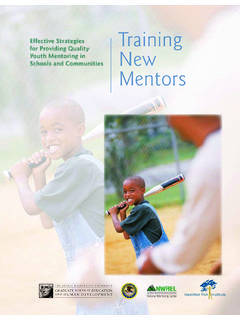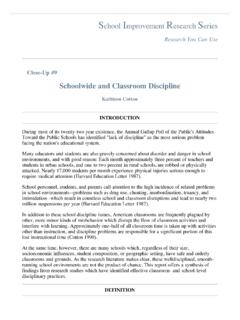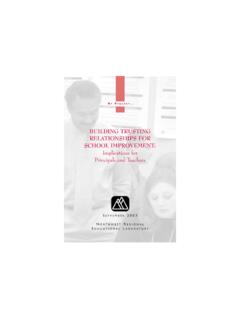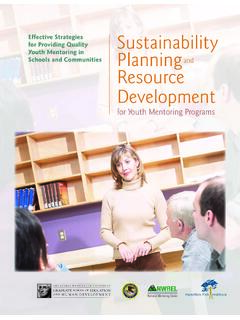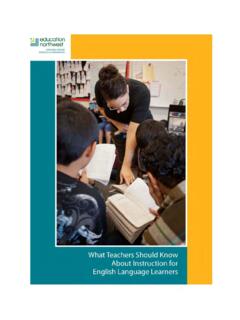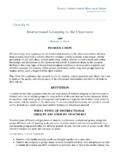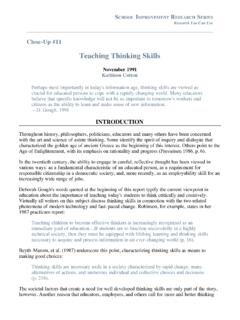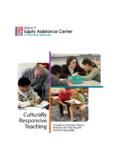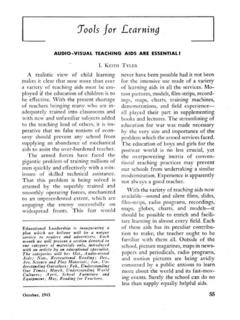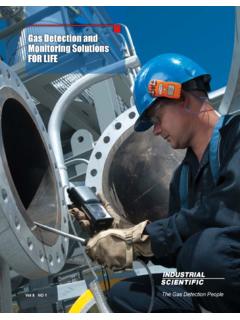Transcription of School Improvement Research Series
1 School Improvement Research SeriesResearch You Can UseClose-Up #6 Parent Involvement in EducationKathleen Cotton and Karen Reed WikelundINTRODUCTIONIt is no wonder that parent involvement with the schools has become a major educational issuein the 1980s. This is an era of increasing concern about the quality of education in this are taking a greater role in monitoring and maintaining academic standards. Communitiesare ever more watchful of the expense of public education. Local schools are concerned aboutcontinuing to provide high-quality teaching and other services with dwindling resources. Andparents want assurance that their children will receive adequate preparation to lead rewardingadult parent involvement a valuable, if largely untapped, resource for schools struggling to providestate-ofthe -art instruction with diminishing funds--a way to instill pride and interest inschooling, increase student achievement, and enhance a sense of community and commitment?
2 Or is it one more responsibility to add to overburdened teachers and administrators--or even athreat to the autonomy and professionalism of the schools?This review of the literature on parent involvement examines these issues, focusing, inparticular on the following five areas:Does parent involvement have positive effects on student achievement? If so, what typeof involvement works best?What are the effects of parent involvement on other student outcomes, such as attitude,self-concept, classroom behavior, and attendance?Is parent involvement useful beyond the preschool and early elementary grades--inmiddle School and high School ? If so, what form should it take?What is known about the uses of parent involvement in predominantly minority and/orlower income communities?
3 What, if any, effects on children's schooling can be attributed to parent involvement in thegovernance of schools?DEFINITION OF PARENT INVOLVEMENTThe term "parent involvement" is used broadly in this report. It includes several different formsof participation in education and with the schools. Parents can support their children's schoolingby attending School functions and responding to School obligations (parent-teacher conferences,for example). They can become more involved in helping their children improve theirschoolwork--providing encouragement, arranging for appropriate study time and space,modeling desired behavior (such as reading for pleasure), monitoring homework, and activelytutoring their children at the home, parents can serve as advocates for the School .
4 They can volunteer to help outwith School activities or work in the classroom. Or they can take an active role in thegovernance and decision making necessary for planning, developing, and providing aneducation for the community's PARENT INVOLVEMENT LITERATURET here are literally hundreds of books, journal articles, and stand-alone reports on the subject ofparents' involvement in their children's education. These writings include Research reports,expert opinions, theory papers, program descriptions, and guidelines for setting up programs. Agreat many of these reports are informative and useful, and, because parent involvement hasbecome a "hot topic" in the past few years, there is considerable current present report synthesizes information from fortyone documents on different aspects ofparent involvement.
5 Because several of these are review/summaries of still other documents,many additional writings are were selected to reflect Research on the effects of parent involvement on studentachievement and other student outcomes. Twenty-five of the supporting documents are researchstudies, eight are reviews, and eight are program descriptions and Research -based guidelines forsetting up programs. All age/grade levels are represented in the Research , as are specific studentpopulations, such as the disadvantaged, special education, and limited English kinds of parent involvement investigated include telephone and written home-schoolcommunications, attending School functions, parents serving as classroom volunteers, parent-teacher conferences, homework assistance/tutoring, home educational enrichment, and parentinvolvement in decision making and other aspects of School governance.
6 The researchersfocused on a variety of student outcome areas, including general achievement; achievement inreading, math, or other specific curricular areas; IQ scores; and an array of attitudinal andbehavioral OF PARENT INVOLVEMENTON STUDENT ACHIEVEMENTThe Research overwhelmingly demonstrates that parent involvement in children's learning ispositively related to achievement. Further, the Research shows that the more intensively parentsare involved in their children's learning, the more beneficial are the achievement effects. Thisholds true for all types of parent involvement in children's learning and for all types and ages more closely at the Research , there are strong indications that the most effective formsof parent involvement are those which engage parents in working directly with their children onlearning activities in the home.
7 Programs which involve parents in reading with their children,supporting their work on homework assignments, or tutoring them using materials andinstructions provided by teachers, show particularly impressive similar lines, researchers have found that the more active forms of parent involvementproduce greater achievement benefits than the more passive ones. That is, if parents receivephone calls, read and sign written communications from the School , and perhaps attend andlisten during parent teacher conferences, greater achievement benefits accrue than would be thecase with no parent involvement at all. However, considerably greater achievement benefits arenoted when parent involvement is active--when parents work with their children at home,certainly, but also when they attend and actively support School activities and when they helpout in classrooms or on field trips, and so Research also shows that the earlier in a child's educational process parent involvementbegins, the more powerful the effects will be.
8 Educators frequently point out the critical role ofthe home and family environment in determining children's School success, and it appears thatthe earlier this influence is "harnessed," the greater the likelihood of higher studentachievement. Early childhood education programs with strong parent involvement componentshave amply demonstrated the effectiveness of this about orientation and training for parents who wish to become more involved in theirchildren's learning? Those Research studies which have compared parent involvement programsthat include orientation/training components with those that do not indicate that providingorientation and training enhances the effectiveness of parent involvement.
9 Research in this areaindicates that parents generally want and need direction to participate with maximumeffectiveness. Orientation/training takes many forms, from providing written directions with asend-home instructional packet; to providing "make-and-take" workshops where parentsconstruct, see demonstrations of, and practice using instructional games; to programs in whichparents receive extensive training and ongoing supervision by School word of caution about training activities for parents: While Research indicates thatorientation/training activities are beneficial, those researchers who have looked at the extent oftraining have found that a little is better than a lot.
10 That is, programs with extensive parenttraining components do not produce higher student achievement than those with only basictraining, and they sometimes experience considerable attrition--presumably because their timeand effort requirements overtax the willingness of parents to stay have also found that the schools with the most successful parent involvementprograms are those which offer a variety of ways parents can participate. Recognizing thatparents differ greatly in their willingness, ability, and available time for involvement in schoolactivities, these schools provide a continuum of options for parent EFFECTS OF PARENT INVOLVEMENTON STUDENT ATTITUDE AND BEHAVIORS ixteen of the documents on which this report is based address the relationship between parentinvolvement and achievement and then also look at the effects of parent involvement on studentoutcomes other than achievement.
